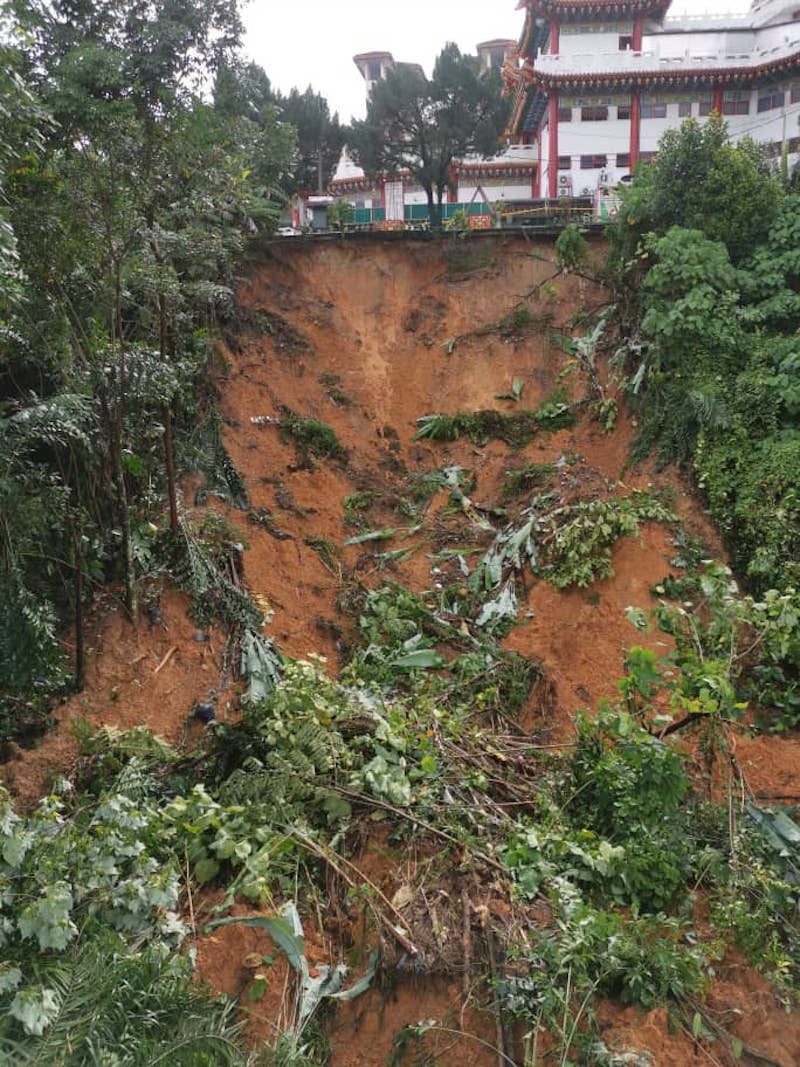KUALA LUMPUR, Oct 9 — One of Kuala Lumpur’s most popular Chinese temples dedicated to the Goddess of Mercy has been issued a two-week notice to repair the hill slope on which it sits after a landslide there forced residents of a nearby condo to evacuate.
The Kuala Lumpur City Hall (DBKL) served the notice on the Thean Hou Temple, located at Robson Heights in Seputeh on October 5.
DBKL’s infrastructure planning department director Datuk Zulkurnain Hassan said that an in-depth investigation was also carried out immediately after the landslide that happened nearly a week ago.
“After we did an in-depth investigation on the status of the landowner as well as the landslide issue, we verified that a large chunk of the soil involved is owned by Thean Hou Temple.
“Therefore, we have already issued a notice to the landowner to take immediate action,” he told Malay Mail when met at DBKL yesterday.
Zulkarnain said the temple has to take two steps: first it needs to immediately repair the eroded hill slope; after that it has to appoint a consultant and submit its long-term plans for the slope to DBKL for approval.
“The period we gave this landowner is two weeks, and if they fail to take the action, DBKL will then decide on the next course of action,” he added.
Experts from Ikram, a geotechnical and geo-environmental engineering firm that is currently in discussion with the temple’s experts was also present at yesterday’s meeting in DBKL to discuss the Seputeh soil erosion problem with the new KL Mayor Datuk Mahadi Che Ngah.
Mahadi was appointed on October 1, replacing Datuk Nor Hisham Ahmad Dahlan.

Prior to his elevation, Mahadi was executive director of planning at DBKL. He remembered the days when the country’s capital city was much greener.
He noted that the several areas in Seputeh were beset by soil erosion issues after the hills were levelled.
“This area always had problems, as these areas developed in those days, it involved a lot of cutting of high hills as this area was a hilltop.
“It was known as Robson Hill,” Mahadi told Malay Mail.
He said the problems usually started when developers who own part of the land start cutting the trees and the hills too rapidly to build on it.
“Perhaps they ignore the condition of the other surrounding land as it is not theirs,” he said.
Mahadi also thinks the soil erosion problem linked to global warming, saying extreme weather conditions affect the stability of the land, especially at hill slopes.
Ikram chief executive officer Datuk Mohd Taufik Haron said that the soil erosion problem at Seputeh is a contained issue, and would not affect any other residents on the hill.
He said that his team has been on site since the landslide happened and have been checking regularly on the soil movement.
Mohd Taufik said that the land area affected was a concave one.
“What does concave mean? There is a valley there,” he said adding that the high concentration of rainfall recently had also contributed to the landslide.
“DBKL and us, we will engage their consultants to address all the issues,” he added.
Residents of a low-density condominium in Seputeh near the Thean Hou Temple were displaced after the October 2 landslide. Their homes were sealed off for safety reasons.
One of the residents who wanted to be known only as Nisha said the slope problem had been 10 years in the making.
She claimed that all that time, her condo management had been liaising with the temple management to reinforce the slope to no avail.
According to Nisha, Thean Hou Temple wanted to build a multi-storey car park on the hill top to accommodate its many visitors, but its plan was purportedly rejected by DBKL on the basis that it needed to get consent from the residents nearby.
She claimed the temple then approached her apartment and offered to undertake the slope reinforcement in exchange for their consent to the construction of its multi-storey car park.
“It was basically closed as a private matter, so settle it between your neighbours. If your neighbours consent, you can go ahead and do so,” she added.

Another resident who gave his name as Raymond claimed to have seen signs of soil movement 10 years ago.
“I have the documents. I took pictures and I indicated that there were fallen trees on the hill slope, which did not look right.
“We sent them to Thean Hou Temple, and at that time already, whenever it rained, we could see water seeping into our car parks,” he told Malay Mail, adding that the problems worsened over time.
Raymond claimed that despite repeated entreaties and the photographic evidence, Thean Hou Temple made no effort to fix its land.
Despite the allegations, Thean Hou Temple has maintained that the landslide occurred off its property, indicating that it was not responsible for the effects.
In a statement dated October 2 sighted by Malay Mail, the temple said that heavy downpour on October 1 triggered the landslide on the hill to its left on Persiaran Endah, Off Jalan Syed Putra.
“The downslope movement occurred last night at about 9pm. It was not at the back hill of Thean Hou Temple as reported earlier in a Chinese newspaper. Landslide at the back hill was not detected,” Thean Hou Temple said in the statement.
It added that its land experts had suggested that the best way to prevent further erosion to the slope is to build a protective rockface or concrete block there.
It also claimed the construction of its multi-storey car park is the best solution to the ongoing problem, and urged DBKL to approve the project “for the sake of public interest”.
















.jpg)


